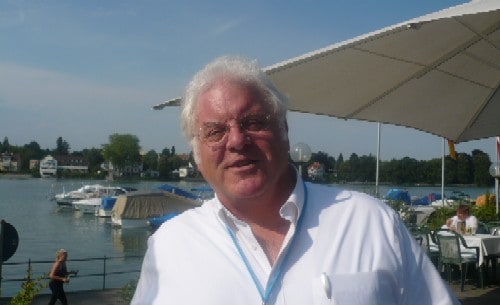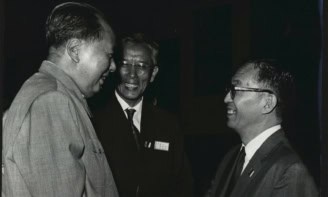
Robert Laughlin believes mankind faces two big hurdles
By Matin Durrani in Lindau, Germany
I mentioned in my previous blog from the 60th Lindau Nobel Laureate Meeting that after my interview with Carlo Rubbia, he headed off to a session on particle physics. In fact, the session was called “What will CERN teach us about the dark energy and dark matter of the universe” and was chaired my former colleague Matthew Chalmers, who was features editor of Physics World until 2007.
Keeping Rubbia and his fellow Nobel laureates on the panel in shape can not have been easy for Matthew, who also had heavyweights David Gross, John Mather, Gerard ‘t Hooft, George Smoot and Martinus Veltman to contend with, plus a live link to the CERN control room that conked out a couple of times.
I’m not quite sure what the conclusion of the debate was – if there was one – although most amusing was Veltman’s comment that “all this stuff about dark matter is total bullshit”. George Smoot also seems to have shaved off his trademark beard – try a Google search.
One Nobel prize-winning physicist who was not at the debate was Robert Laughlin (pictured), who shared the 1988 prize for his work on quantum fluids with fractional charges. Obviously he’s not a particle physicist and so one would not have expected him to attend, but he’s certainly ruffled a few feathers in the past with this views on fundamental physics.
Laughlin believes, for example, that while the reductionist approach to physics – so beloved of all particle physicists – works up to a point, it only goes so far. He reckons that nature is instead regulated by “powerful and general principles of organization” such as symmetry breaking and that these cannot be deduced mathematically from first principles, being “emergent” in nature.
Laughlin presented those views on emergence in a great (but sadly little known) book he published in 2005, A Different Universe: Reinventing Physics from the Bottom Down, in which showed how you cannot really understand nature by reducing it to a set of ever-smaller component particles that interact with each other according to certain laws. Just think about high-temperature superconductivity of the working of the brain.
But sitting out on the sun-drenched terrace at the conference venue on the shores of Lake Constance, while Veltman and pals were arguing inside over whether CERN would spot dark matter and supersymmetry, Laughlin revealed that he’s just finishing a new book on a very different topic to his last – what we will do when coal runs out.
Tentatively called When Coal is Gone, it presents Laughlin’s view that mankind faces two big hurdles. The first is what we will do when there is no more oil, which could be in 60 years’ time. (Answer: start turning coal into fuel for cars or planes, even though this will consume more energy than it generates.) The second is what we will do when there is no more coal. (Answer: start extracting carbon from the air or oceans.)
Apologies if that’s a grotesque and gross simplification of what are probably much more clearly thought-out and nuanced arguments but that, I think, is the gist of his book.
As far as Laughlin is concerned, nothing can really beat the energy density of carbon-based fuels and that, because we have all got so used to them, there’s no way anyone would choose to do without them in future. After all, plot national GDP against energy consumption and you have pretty much a straight line, albeit with a few outliers. (Energy, in other words, is essential to economic growth and unless we all start eating carrots from our garden and stop travelling anywhere and give up buying big new televisions, the global demand for energy will just keep on rising.)
There’s a lot more he had to say which I’ll have to turn into a more coherent article at some point. We need, for example, to separate out our thinking on energy and climate change. Nuclear power will still play a role in the future, while the need for energy will dictate the future of the global geopolitical system.
But Laughlin is great company, is well read, and has one stream of thought after another. Indeed, here’s one question he posed that got me thinking: if the Earth’s core is so hot, why are the oceans so cold?



